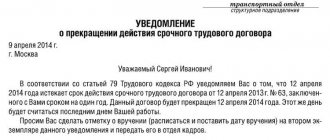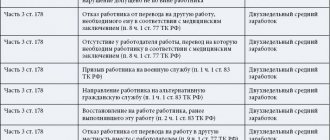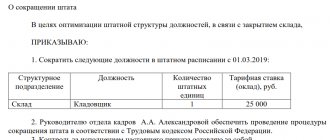It happens that an employee comes to work one day and learns about staff reductions. This can happen in a large organization or a small company. This news sounds like a bolt from the blue. Many people are familiar with this situation. Many questions immediately arise: what rights does an employee have, what payments are he entitled to during layoffs, should pregnant women, mothers of young children, disabled people, and pensioners be afraid of layoffs?
The employer himself is interested in complying with the law upon dismissal, since the employee can file a complaint with the court or the labor inspectorate; if violations of the dismissal procedure are detected, the employer will be punished. It is best to find out in advance all the nuances of dismissal during staff reductions.
Who can't be laid off?
Due to staff reduction, it will not be possible to fire certain people:
- women expecting the birth of a baby;
- citizens on vacation (and maternity leave too);
- single mothers;
- women raising children under 3 years old, disabled children;
- disabled people;
- persons raising children under 14 years of age without mothers.
This rule is powerless in a situation where the organization is completely liquidated as a legal entity and is unable to fulfill its obligations towards anyone. Then all employees are fired in a row.
The postulates of Article 179 of the Labor Code of the Russian Federation imply that employees who work more productively have an advantage, but the criteria for which people work more efficiently are not specified at the legislative level; the decision depends entirely on the subjective conclusion of the employer.
If they are equally useful, the following have priority:
- the only breadwinners in the family;
- citizens who received injury or occupational disease at the enterprise;
- citizens undergoing advanced training at the will of the employer;
- persons who support two or more people.
In addition to the Labor Code of the Russian Federation, there are a number of laws at the federal level that give advantages when reducing staff to certain categories of persons:
- military wives;
- military personnel sent to reserve;
- authors of inventions.
Internal documents of the organization can also determine the groups of people who are the last to be laid off; these decisions are made at general meetings of the team.
Documentation
The list of documentation that must be completed upon dismissal under a fixed-term employment contract depends on whose party initiates it:
- Application for resignation of one's own free will (submitted by an employee resigning on his own initiative);
- Written notice of dismissal (if the dismissal is initiated by the employer);
- Order of dismissal;
- Act on the employee’s refusal to familiarize himself with the contents of the order (if any);
Conditions for reduction according to the rules
The employer must inform the citizen in writing about the upcoming layoff two months before the dismissal; this must be done against a signature. A person may not want to sign a document, then you need to create an act and verify it with the signatures of witnesses. If a citizen does not argue with dismissal on such grounds, the employment agreement with him can be canceled at any time.
In this case, the person is guaranteed to receive material compensation in the amount of wages that he could have received for the period of time before the expiration of the contract.
For an employee who has been laid off, the employer company must find another place in the company or its branch, and it is advisable to select him, taking into account the qualifications of the citizen.
If there are appropriate conditions in the employment agreement, it is permissible to offer a position lower than the current one, in addition, the vacant position may be located in another region. The norms of Articles 81 and 180 of the Labor Code of the Russian Federation are designed to resolve such situations. The redundant employee may refuse other positions offered, then a document should be created regarding this, certified by the signatures of several witnesses. This minimizes the risk of further litigation.
When dismissing an employee due to staff reduction, the same form is used as for dismissal, for example, by agreement of the parties - this is No. T-8 or No. T-8a if there are two or more employees. A dismissal order is drawn up.
The text must be entered into the work book based on clause 2 of part 1 of Article 81 of the Labor Code of the Russian Federation: “Dismissed due to a reduction in the company’s staff.”
Actions of an employee upon layoff
An employee who has been laid off must carefully study the manager’s order before signing.
It is necessary to pay attention to the following nuances:
- The document bears the signature of the boss, the date of preparation is indicated, and there are bank details;
- The order contains a list of vacancies indicating the salary;
- The notice bears the mark of the workers' union that approved the layoff.
The notice may not be signed if one of the listed points has not been met. A citizen has the right to report violations to the Labor Inspectorate. There are situations when the director demands to write an explanatory note about the reasons for the refusal. It is recommended to make two copies - one to give to the manager, and the second to be certified and kept for yourself.
"Conscripts"
In accordance with clause 2, part 1, art. 77 of the Labor Code of the Russian Federation, the basis for termination of an employment contract is the expiration of the term of the employment contract (Article 79 of the Labor Code of the Russian Federation).
The employee must be notified in writing of the termination of the employment contract due to its expiration at least three calendar days before dismissal, with the exception of cases where a fixed-term employment contract concluded for the duration of the duties of the absent employee expires. An employment contract concluded for the duration of a specific work is terminated upon completion of this work.
Conclusion 1: The dismissal of an employee due to the expiration of the employment contract is also legal on the last day of his vacation (after its end), while the employment contract is not considered to be extended for an indefinite period
Example: the head of the department did not agree with the dismissal under clause 2, part 1, art. 77 of the Labor Code of the Russian Federation in connection with the expiration of the employment contract and challenged it in court. The court, having examined the documents presented by the parties, came to the conclusion about the legality of concluding a fixed-term employment contract (based on a competition, with a scientific and pedagogical worker, which is allowed by Art. Art.
59, 332 Labor Code of the Russian Federation and Art. 20 of the Federal Law “On Higher and Postgraduate Professional Education” dated August 22, 1996 No. 125-FZ). The court also correctly concluded that the employer complied with the requirements of Part 1 of Art.
79 of the Labor Code of the Russian Federation, according to which the employee must be warned in writing about the termination of an employment contract due to its expiration at least three calendar days before dismissal.
The plaintiff's assertion that he was fired after the expiration of the employment contract, when, in his opinion, the employment relationship actually continued for an indefinite period, the court found unfounded on the following grounds. Yes, Art.
Common mistakes
If we talk about typical mistakes when abbreviating, these include:
- absence (non-delivery) of notice of reduction;
- dismissal of an employee before the two-month notice period;
- failure to notify employment authorities and the trade union (if any) within the established time limits;
- failure to offer vacancies when available.
When it comes to reducing the number of employees, a fairly common mistake is failure to conduct or incorrect assessment of the preemptive right (Article 179 of the Labor Code of the Russian Federation). For example, employers often have no criteria for assessing labor productivity and qualifications at all, or these criteria are recognized by the courts as subjective.
Features of dismissal of pensioners due to staff reduction
Reaching retirement age does not constitute an unconditional basis for dismissal or layoff. Mature age can provide a certain advantage, according to the interpretation of Article 179 of the Labor Code of the Russian Federation.
A pensioner dismissed due to staff reduction is given equal rights with all other employees, that is, he is entitled to all payments guaranteed by Article 178 of the Labor Code of the Russian Federation. Otherwise, the identity of workers’ rights will be ignored and the prohibition of discrimination in the field of labor – Articles 2 and 3 of the Labor Code of the Russian Federation – will be violated.
Offer of a temporary position in case of layoffs
Employees must be paid severance pay in the amount of their average monthly earnings and retain their average earnings for the period while the dismissed person is looking for work (but no longer than two months from the date of dismissal)8. You also need to issue orders to terminate employment contracts in Form No. T-89 and make entries in the work books of dismissed employees.
The entry will look like this: “Dismissed due to a reduction in the number (staff) of the organization’s employees, paragraph 2 of part 1 of Article 81 of the Labor Code of the Russian Federation.” We are preparing documents for the court. The reduction in staffing levels must actually take place. This fact is confirmed by the presentation to the court of the staffing table before the reduction procedure and after its completion (after the reduction, the new staffing schedule approved by the order must be in effect).
Consequently, the employer is not obliged to offer a position occupied by a part-time employee to a layoff employee, dismissing the latter and providing the vacated position to the layoff employee. Yuri Ivanov, senior lawyer in the labor law practice of the law firm Goltsblat BLP Temporarily vacant positions as a vacancy A vacant position must be understood as a position that is legally (no one is listed in the staffing table) and actually not occupied by anyone.
It is not a vacant position in which an employee is listed in the staffing table, but is temporarily not working and can always return. For example, a position retained by an employee during the period of parental leave (Art.
256 of the Labor Code of the Russian Federation) or sick leave for pregnancy and childbirth (determination of the Investigative Committee in civil cases of the Omsk Regional Court dated February 15, 2012 No. 33-1239/2012). If a position is occupied by a part-time person, it is also not vacant. Among other things, you will need to make entries about the permanent transfer in the employee’s work book and personal card (Article 66 of the Labor Code of the Russian Federation, instructions approved by Resolution of the State Statistics Committee of Russia dated January 5, 2004 No. 1). It should be noted that if, at the end of the temporary transfer of a foreign employee, carried out without his consent, it is impossible to provide him with his previous job, then he must be fired (Clause 10, Part 1, Article 327.6 of the Labor Code of the Russian Federation). Ivan Shklovets, Deputy Head of the Federal Service for Labor and Employment 4. Judicial practice: The employer fired an employee without offering him suitable positions that are temporarily vacant, for example, the main employee is on a long vacation or business trip. Dismissal due to reduction is allowed only if the employee cannot be transferred with his written consent to another job available to the employer.
The procedure for reducing the number or staff of employees consists of several stages. Order to reduce First of all, the head of the company issues an order to reduce the number or staff, which indicates the positions to be reduced.
The new staffing table (with the changes that resulted from the reduction) must be approved by the same or a separate order. In 2011, Aktiv LLC rented a building for an office in which it carried out its activities. In 2012, management decided to reduce rental costs due to the unstable financial situation of the company. Since February 2012, Aktiv LLC has been renting half of the building, and therefore the manager decided to reduce the number of cleaners (from two to one). An order was issued to reduce the number (see below). Limited Liability Company "Aktiv"
Experts from the GARANT Legal Consulting Service examined the procedure for laying off an employee in a situation where a fixed-term employment contract was concluded between him and the company. According to a fixed-term employment contract, the employee was hired temporarily due to the company concluding a civil contract with a third party
03/24/2017 Naumchik Ivan, expert of the Legal Consulting Service GARANT
Termination of a fixed-term employment contract
In accordance with part one of Art. 58 of the Labor Code of the Russian Federation, employment contracts can be concluded for both a definite and an indefinite period.
If the nature of the employment relationship is due to the need to perform temporary work that the employer has in connection with the conclusion of a civil contract with a third party, the parties to the employment contract have the right to conclude a fixed-term employment contract on the basis of paragraph eight of part one of Art. 59 Labor Code of the Russian Federation. According to this norm, a fixed-term employment contract is concluded with persons hired to perform a clearly defined job in cases where its completion cannot be determined by a specific date. In this case, when concluding a fixed-term employment contract, the specific duration of its validity is not indicated.
A fixed-term employment contract is terminated upon expiration of its validity period, except for cases where the employment relationship actually continues after the expiration of the employment contract and neither party has demanded its termination (clause 2 of part one of Article 77, part one of Article 79 of the Labor Code RF). If a fixed-term employment contract was concluded to perform certain work, the completion of which cannot be determined by a specific date, such a contract, by virtue of part two of Art. 79 of the Labor Code of the Russian Federation, terminates upon completion of this work (clause 14 of the Resolution of the Plenum of the Supreme Court of the Russian Federation dated March 17, 2004 N 2 “On the application by the courts of the Russian Federation of the Labor Code of the Russian Federation”).
The employee must be warned in writing about the termination of the employment contract due to its expiration at least three calendar days before dismissal (part one of Article 79 of the Labor Code of the Russian Federation). Otherwise, the termination of a fixed-term employment contract is completed in accordance with the general procedure provided for in Art. 84.1 Labor Code of the Russian Federation.
Moreover, before the expiration of the employment contract, it can be terminated on other grounds provided for in Art. 77 of the Labor Code of the Russian Federation, including in connection with a reduction in the number or staff of the organization’s employees (clause 4 of the first part of Article 77, clause 2 of the first part of Article 81 of the Labor Code of the Russian Federation) (see, for example, the appeal ruling of the Khabarovsk Investigative Committee for civil cases Regional Court dated 07/08/2016 in case No. 33-4562/2016).
Reduction of staff, employee and fixed-term employment contract
The Labor Code of the Russian Federation provides for the dismissal of a citizen at the will of the employer, including due to staff reduction. Labor law contains a detailed description of the dismissal procedure.
These rules do not apply to people with whom fixed-term employment agreements have been signed for the duration of seasonal work and for a period of up to two months. When staffing is reduced, the employer is forced to inform seasonal employees 7 calendar days in advance, and those hired for a period of up to 2 months - 3 days in advance.
Often, under a fixed-term employment agreement, people are hired to perform the functions of women on maternity leave. Such employees cannot be dismissed due to staff reduction due to the requirements of Article 256 of the Labor Code of the Russian Federation. In other situations, they are subject to dismissal due to staff reduction on the same basis as everyone else.
Deadlines and application
Working hours under a fixed-term employment contract upon dismissal at the employee’s initiative is two weeks, but only on the condition that the contract was signed for a period of more than two months. This is regulated by Art. 80 Labor Code of the Russian Federation.
According to the general rules, the minimum period of work after dismissal of a temporary worker is two weeks , but there are a number of nuances:
- If the work contract was signed for a period of less than two months, then the employee must inform about his resignation no later than 3 days in advance. A similar rule applies to the dismissal of an employee at the initiative of the employer.
- The employee is on a probationary period - three days of work.
- Heads of enterprises, coaches and athletes with a work contract lasting no more than 4 months - a month of work.
At the same time, to warn the authorities, the employee is obliged to write a letter of resignation, drawn up in accordance with all the rules (regulated by Article 292 of the Labor Code of the Russian Federation). The application is written in the name of the head of the enterprise, if it is a government organization, or in the name of the owner of the company (private enterprise).
The application must include the following information:
- grounds for concluding a fixed-term work contract;
- reason for leaving position;
- request to terminate the contract.
They also note situations where a fixed-term worker can be terminated without working off:
- admission to the University;
- retirement;
- violation of the contract by the employer;
- consent of both parties.
Guaranteed payments upon redundancy
When reducing staff, a scrupulous development and implementation of the dismissal process is required in accordance with labor law, impeccable execution of calculations of amounts due in the standard version, when the employee was informed about the reduction eight weeks before dismissal, and he worked through them. Set of guaranteed payments:
- Salary for the period worked in the month in which the dismissal took place.
- Compensation for unused vacation.
- Benefit in the amount of average monthly earnings.
- Average monthly earnings while looking for a new job.
Special cases
- For a seasonal worker, calculations are made based on the amount of payment for two weeks.
- A person with whom a fixed-term employment agreement was signed for a period of less than two months should not hope for additional payments.
- A person who performs part-time work is given compensation in the amount of the average monthly salary. He has no right to compensation for the next two months, since he has his main place of work.
Employee redundancy
occurs in accordance with paragraph 2 of Art. 81 of the Labor Code of the Russian Federation. The employer, at its discretion, regulates the number of employees in accordance with production needs or other factors worthy of attention. Thus, layoff of an employee is the personal will of the employer to terminate the relationship. In connection with this law, a special procedure is provided for dismissing an employee due to staff reduction, since this to a certain extent violates the right to work, since the employer does not ask for his consent.
A redundant employee fell ill
If on the day of dismissal a redundant employee was paid all the money due under labor law, and he, for example, fell ill during the first month and brought sick leave to the employer, the question arises: should the amount paid on sick leave be deducted from the compensation issued? There is no direct answer to this question in the legislation. A study of legal norms, law enforcement and judicial practice proves that it would be correct to make both payments: compensation and accruals for sick leave.
These payments are made for various reasons; the rules of law do not provide for the offset of temporary disability benefits against compensation issued for the period of job search.
I was laid off on a fixed-term contract, what are the payments?
It turns out that compensation for dismissal under a fixed-term contract for 1 month should be paid based on the average earnings for two days. Another feature when calculating compensation for unused vacation is that if a person worked more than fifteen days, that is, more than half a month (in February it will be fourteen days), compensation is paid for two days, but if he worked for less than half a month, at least for one day, compensation is not paid at all. Compensation for unused vacation under a fixed-term employment contract When concluding a fixed-term employment contract, a person sometimes does not think about whether he is entitled to annual leave. But after a while, this question may arise as needed.
The legislator, in Article 114 of the Labor Code of the Russian Federation, provided that when concluding any employment relationship, employees are guaranteed additional rest (vacation) in addition to weekends. Nizhny Novgorod region Novgorod region Novosibirsk region Omsk region Orenburg region Oryol region Penza region Perm region Primorsky region Pskov region Rostov region Ryazan region Samara region St. Petersburg Saratov region Sakha (Yakutia) rep. Sakhalin region Sverdlov Skye Sevastopol region, North Ossetia - Alania, Smolensk region, Stavropol region, Tambov region, Tatarstan, Tver region, Tomsk region, Tula region, Tyva, Tyumen region, Udmurt region, Ulyanovsk region, Khakassia, Khanty-Mansiysk region. env. - Yugra, Chelyabinsk region, Chechen Republic, Chuvash Republic, Chukotka Autonomous Region. environs of the Yamalo-Nenets Autonomous Okrug. vicinity of Yaroslavl region. Do you want to become a project expert? If you are a lawyer, human rights activist, or simply a qualified specialist in one of the areas of law, you can send us an application to join the team of Experts.
Calculation terms
The delivery of funds guaranteed in case of staff reduction should be carried out within the time limits specified by law.
On the day of dismissal
The final payment is issued: wages, compensation for unused vacation, benefits for the first month, which is not affected by future employment.
At the end of the second month
According to Part 1 of Article 178 of the Labor Code of the Russian Federation, when a former employee presents to the employer a work book indicating that he has not been hired, and an application requesting the payment of his average monthly salary while looking for a job, taking into account the benefits issued on the day of dismissal.
At the end of the third month.
Following the requirements of Part 2 of Article 178 of the Labor Code of the Russian Federation, the average monthly salary for the third month during the period of job search is due to a person under the following circumstances:
- Before the 14th day after the termination of the employment agreement, he came to register with the employment service at his place of residence.
- For three months after the abolition of the labor agreement, he was not given a new job by the employment authorities.
The employment service will provide the citizen with a document that serves as the basis for issuing him a benefit in the amount of the average monthly salary for the third month after dismissal.
The average monthly salary, calculated at the stage of applying for a job, does not need to be paid exactly on the dates specified in the company’s internal documents as paydays. These days can be established by mutual agreement with the citizen.
Answer
Yes, laying off a temporary worker is legal.
The expert shares important information about reducing the number or staff of employees in the material at the link.
Current legislation provides for the right of an employer to dismiss employees through a layoff procedure. At the same time, the following employees have been identified who cannot be laid off:
- pregnant women;
- women who have children under three years of age;
- single mothers raising a disabled child under 18 years of age or a young child under 14 years of age, as well as other persons raising these children without a mother;
- a parent or other legal representative of a child who is the sole breadwinner of a disabled child under the age of 18;
- a parent or other legal representative of a child who is the sole breadwinner of a child under three years of age in a family where there are three or more young children, provided that the other parent or other legal representative does not officially work;
- employees during vacation and temporary disability.
Such rules are provided for by Part 6 of Article 81, Article 261 of the Labor Code of the Russian Federation.
However, temporary workers are not included in the number of employees who cannot be laid off. Consequently, the reduction of temporary employees, including before the end of their contract, can be carried out in accordance with the general procedure.
Please note that there are two categories of temporary employees for whom layoffs are carried out according to special rules. These are seasonal workers and workers with whom the employment contract is concluded for a period of up to 2 months.
Seasonal workers are notified of layoffs no later than 7 calendar days before dismissal and are entitled to severance pay in the amount of two weeks' earnings.
Employees with whom the employment contract is concluded for a period of up to 2 months are notified of the layoff at least three calendar days in advance. Severance pay upon dismissal is not paid, unless otherwise provided by federal laws, a collective agreement or an employment contract.
Such rules are established by Articles 292 and 296 of the Labor Code of the Russian Federation.
Please note that if your temporary employee is hired for a period of temporary absence of the main employee (maternity leave, nursing leave, long-term illness), then the position cannot be reduced, because the absent employee is guaranteed the provision of the same job upon termination of the temporary absence. From which it follows that such a temporary employee cannot be dismissed due to reduction (since the position cannot be reduced before the main employee returns to work). If in such a situation the main employee returns to work, then the temporary employee is dismissed not due to layoff, but due to the expiration of the contract term.
Details in the System materials:
Situation:
Which employees cannot be fired when reducing staff or numbers.
During layoffs, the employer is prohibited from dismissing:
- pregnant women;
- women who have children under three years of age;
- single mothers raising a disabled child under 18 years of age or a young child under 14 years of age, as well as other persons raising these children without a mother;
- a parent or other legal representative of a child who is the sole breadwinner of a disabled child under the age of 18;
- a parent or other legal representative of a child who is the sole breadwinner of a child under three years of age in a family where there are three or more young children, provided that the other parent or other legal representative does not officially work.
Such rules are provided for in Article 261 of the Labor Code of the Russian Federation.
Ivan Shklovets
, Deputy Head of the Federal Service for Labor and Employment
With respect and wishes for comfortable work, Igor Ivannikov,
Sep 10, 2019adminlawsexp
Calculation of payments
Wages for the past month in which the dismissal took place are calculated as standard, taking into account all previously applied allowances.
Compensation for unused vacation
It is considered as the average monthly salary for vacation pay, based on the provisions of Part 4 of Article 139 of the Labor Code of the Russian Federation, as well as paragraphs 10,11,12 of the Regulations on the specifics of the procedure for calculating average wages, approved by Decree of the Government of the Russian Federation No. 922 of December 24, 2007. Compensation is calculated based on calendar days actually unused at the time of dismissal.
Important aspect. A person who has worked for a company for more than 12 months and is dismissed due to layoffs can expect to receive compensation for the last year in the maximum amount if the length of service that guarantees annual paid leave exceeds 5.5 months.
Severance pay
It is calculated in the amount of the average monthly salary, calculated according to the standards of Part 3 of Article 139 of the Labor Code of the Russian Federation and paragraph 9 of the Regulations on Average Earnings. The average daily wage is calculated by dividing the actual accrued earnings by the number of days actually worked.
When maintaining summarized working time records, severance pay is calculated for hours not worked by the employee due to dismissal. The number of hours is calculated from the established length of working time.
Average monthly salary during the job search period.
The job search period is calculated from the day following the day of dismissal until the day after which new employment begins, or until the day on which the period from the date of dismissal ends, which is equal to two months.
When abbreviating for calculating the average daily wage, the following are not taken into account:
- temporary disability benefits;
- vacation accruals;
- cost of gifts.
Payments and compensations
Regardless of the reason for dismissal, on the employee’s last day of work, the employer must pay it off by paying:
- Wages for days worked;
- Unused vacation days;
- Other eligible payments.
In the event of early termination of employment (for example, due to staff reduction or liquidation of an enterprise), the employee is entitled to payment of certain compensations, namely:
- Compensation of wages for several months;
- Compensation for the vacation period upon dismissal if the employee did not have time to use it.











